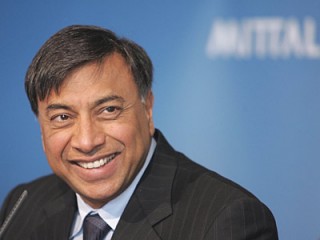
Lakshmi Mittal biography
Date of birth : 1950-06-15
Date of death : -
Birthplace : Sadulpur, Rajasthan, India
Nationality : Indian-British
Category : Arhitecture and Engineering
Last modified : 2011-09-13
Credited as : businessman, steel magnate, CEO of ArcelorMittal
0 votes so far
Mittal was born in 1950 in Sadulpur, India, a desert village in the state of Rajasthan. His family moved to Calcutta in the early 1960s, where his father became a partner in a small steel company that began to prosper. By 1969, Mittal had earned a degree in accounting from St. Xavier's, a prestigious college in Calcutta (now Kolkata), and joined the family steel business. In 1976, he traveled to Indonesia to look into a real-estate investment for his father, and convinced him to purchase a rundown steel mill there instead.
The roots of Mittal's empire were in that Indonesian mill. He founded his own company, which he called Ispat, the Sanskrit word for "steel," and modernized the mill. It was a formula he replicated around the globe over the next decade: Mittal acquired mills in Trinidad, Mexico, and Algeria, and turned the enterprises into profit-making plants, often by installing Indian managers trained at his family's successful operations. With the collapse of the Soviet Union in 1989, he recognized new opportunities for his company, because the heavily industrialized Eastern Bloc boasted many immense steel mills. In 1995 Mittal made an enormous investment in one in Kazakhstan, a newly independent republic of the former Soviet Union. The Temirtau ("Iron Mountain") works was close to the vast ore deposits required for the steelmaking process, but the plant had no heat or hot water, and workers had not been paid in months. Mittal spent $1 billion to buy and renovate the plant, and it became one of the showpieces of his growing empire.
Mittal, married and the father of two, moved his family to London in 1995. He formed social relationships with a roster of prominent Britons, including members of the Labour Party, but his connections landed both him and British Prime Minister Tony Blair on the front pages of British newspapers in 2001 in what the press soon dubbed "Mittalgate." Mittal wanted to buy Romania's state-owned steel company, Sidex, and Blair wrote a letter on his behalf to the Romanian government. Blair noted that the holding company for Mittal's international steel ventures, LMN Holdings, was a British company, but it was not; it was instead registered in the Dutch Antilles, partly as a strategy to avoid onerous British taxes. The newspaper accounts also revealed that Mittal had donated heavily to Labour Party coffers earlier that year, and the incident was portrayed as a cash-for-favor deal between Mittal and Blair's party. In the end, Mittal acquired Sidex, and Blair disavowed knowledge of the Labour Party donation and the fact that LMN was a corporation registered elsewhere.
Mittal returned to the headlines in Britain in October of 2004, when his company merged with the International Steel Group, a holding group of five major U.S. steel mills. With the purchase, Mittal Steel became the world's biggest steel producer, and the payout also made Mittal Britain's wealthiest citizen.
The following year, Mittal acquired a stake in China's Hunan Valin Iron & Steel Group for $314 million, which gave him 37 percent ownership. Industry analysts were not surprised that Mittal had ventured into China, which is the world's single largest exporter and importer of steel, but warned that if the price of steel fell, his investment might prove a risky one.
Mittal scored another coup in June of 2006, when he emerged victorious in a bitter battle to acquire Arcelor of Luxembourg, the second largest steel company in the world and Europe's biggest. Arcelor executives were opposed to the buyout, and waged a war of words in Europe's business press; at one point they even tried to set up a deal with a Russian company to head off Mittal's takeover bid. The "critics," according to New York Times journalist Heather Timmons, "have commented on everything from the quality of the steel that [Mittal] makes to his grammar. Arcelor executives have even referred to Mittal Steel as a 'company of Indians' and the bid as 'monkey money.'" Arcelor shareholders, however, voted in favor of Mittal and his company, with its profitable track record.
The British press continues its fascination with Mittal and his family, which includes his son, Aditya, who serves as president and chief financial officer of Mittal Steel. Mittal's daughter, Vanisha, was married in 2004 in an extravaganza in France that reportedly cost $55 million. Mittal also owns the most expensive private residence in London, a mansion at Kensington Palace Gardens. Valued at $128 million and boasting a swimming pool embedded with costly jewels, the home was once owned by the founder of the Reuters news agency.
In his bid to gain control of Arcelor, Mittal gave up majority control of his own company, reducing his stake from 88 percent to less than 44 percent of a combined Arcelor-Mittal. The difference did not alter his status as the world's fifth richest person, nor his estimated personal worth of $27 billion. Nor were there doubts that he would retain his intensely involved managerial style, which set him apart from his industrial-titan predecessors in the West. In a rare interview with Nelson D. Schwartz in Fortune , Mittal remembered a business trip to the United States back in the early 1990s, when he met several leading steel-company executives. "Come Friday, everyone was saying have a nice weekend and play golf well," Mittal said. "I never played golf, and it shook me that the mentality was that you work for five days of the week and play golf for the rest."
















